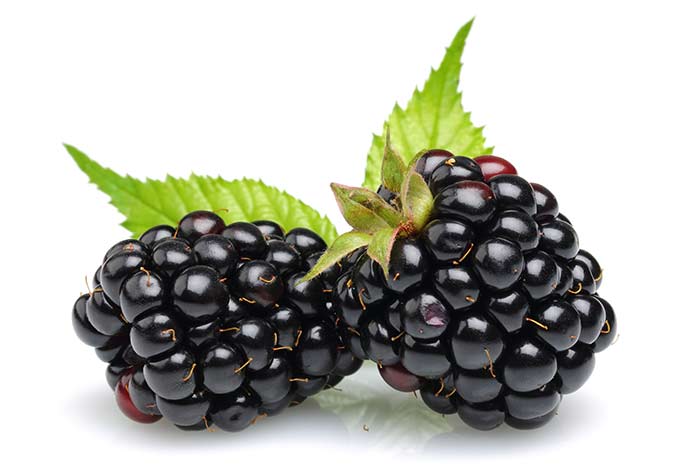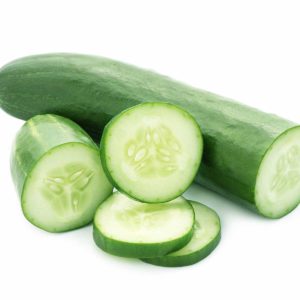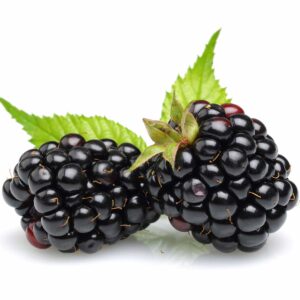
You may have noticed that some blackberries taste bitter, while other summer berries like raspberries or blueberries don’t. The stem end and core in the blackberries contains the bitter compounds.
Adding sugar or fat (like heavy cream / whipped cream) balances out the bitterness, and salt reduces our ability to taste it. The bitter compounds also break down with heat, so a pork tenderloin simmered with blackberries will taste less bitter, as will a blackberry pie.
Why are blackberries bitter?
The amount of time the blackberry was allowed to ripen affects how bitter or sweet it will taste. Unripe berries start out bitter and that lessens as they ripen on the vine. When picked fully ripe, blackberries taste very sweet with no trace of bitterness.
Unripe blackberries often make their way into grocery stores because they ship better and store longer (two things grocery stores prioritize). Once the berries are picked, they no longer get sweeter (or less bitter). However, they'll still have their characteristic dark color, making it nearly impossible to tell how they'll taste just by looking at them.
Farmers markets usually have better quality than the grocery store (as they don't need to be picked unripe to endure shipping). Most sellers at farmers markets also let you sample the fruit, so you know exactly how sweet they will be before buying.
Lastly, weather and growing conditions can affect bitterness. Most experts agree under-watering or below-average rainfall results in higher levels of bitter compounds in blackberries. But on the flip side, heavy rainfalls shortly before harvest can dilute their flavor, making them taste bland.
Blackberries can taste soapy
Some people can also detect a soapy taste on blackberries. This is due to the presence of two aldehyde compounds: saponins and decenal. Saponins are used in soap for its foaming qualities. Decenal is responsible for a waxy orange aroma as well as soap flavors.
If you've ever thought cilantro tastes soapy, it's because it has the same two compounds. The soapy taste of these aldehyde compounds are linked to genetics.
If blackberries taste soapy to you, I'm not sure if that can be fixed. That said, other varieties and climates produce blackberries that have different amounts (pdf) of each compound, possibly yielding less soapy-tasting berries.
For example, Marion Blackberries from Oregon were tested by OSU and found to have significant levels of saponin. Other berries (like strawberries and raspberries) appear to not have saponins or at least not to the same concentration of blackberries.
How to reduce bitterness
You did your best to find ripe, sweet blackberries and now you're stuck with a bitter disappointment. When eating fresh out of hand, there isn't anything you can really do to save them. But on the up side, there's a lot you can do make them taste great for anything else.
Remove seeds
Bitterness is concentrated in the white core and seeds. While you can't really 'core' a blackberry, you can at least remove seeds in certain cases. For example, if you're making a sauce, jam, ice cream, or smoothie, you can easily strain out the seeds.
Balance bitter with fat
Rich food often benefits from a little added bitterness, and the other way around. In the case of blackberries, adding them to ice cream creates a balanced sweet-fat-bitter combination that can actually end up more interesting. You can also try eating fresh berries with whipped cream.
Blackberries and cheese pair well together too, making them a nice addition to a charcuterie board.
Adding to salads can work if done right. Use mild greens (avoid bitter ones like endive), then add blackberries, a fatty meat like prosciutto, cheese, and a good olive oil dressing (more fat).
Add sugar & salt
Sugar will mask some bitterness, making jams, syrups, sauces, ice creams, and pies a good option. They also work well when paired with other, sweeter fruit like peaches.
Salt reduces our ability to taste bitterness, so using blackberries in savory food works out really well and often adds extra complexity to the dish. Pork, steak, duck, and venison all pair well with a blackberry sauce or reduction.
Use heat
The bitter compounds break down with heat, so you can turn to baking or stove-top cooking to fix your blackberries. This is one of the best options, in my opinion, because it allows you to use several methods at the same time.
For example, blackberry pie uses sugar, a tiny amount of salt (that may or may not be enough to reduce bitterness), and heat. Pairing meat with a blackberry reduction uses heat, salt, and often sugar.
You can also get creative and cook blackberries down into a sauce before adding to a smoothie, ice cream, or even a salad dressing.
How to sweeten blackberries
Sweet and bitter flavors inhibit each other. Look at grapefruit for example, less bitter grapefruit taste sweeter and adding sugar to a bitter grapefruit reduces bitterness.
When you want to sweeten blackberries, first reduce the bitterness. Next, you can add sugar by macerating the berries and still be able to eat them whole.
If you are willing to cook them down, their sugars will concentrate, making them sweeter as well. Lastly, you can make a blackberry jam or syrup, which use so much sugar that it should be nice and sweet without tasting bitter at all.
Super-tasters & bitter receptors
If you've tried to reduce bitterness and it still doesn't seem like enough, perhaps you are a super taster. About 25% of people are super tasters, which means they have twice as many taste buds (or even more) than the average person. This means flavors are more intense, from bitterness to the heat from a hot sauce.
Some people are also able to detect certain bitter compounds, while others cannot. I attended a food conference where we used test strips (like these) to determine who could sense bitterness. I was able to detect the bitter compound being tested and I also was identified as a super taster.
That test strip tasted so extremely bitter to me that I couldn't get the taste out of my mouth for an hour. Meanwhile other people shrugged it off, claiming it just tasted like paper.
Buy boysenberries or another fruit
Boysenberries look like a red-purple version of blackberry rather than the blue-black color of blackberries. Boysenberries are actually a cross between a raspberry and blackberry, making them naturally taste sweeter and usually less bitter than blackberries.
Most any recipe will work when substituting boysenberries, from pies to reductions for meat. Raspberries can also work but they don't add as much complexity to meat dishes. They also tend to add sweet on top of more sweet for desserts that call for blackberries (which are relying on some of the bitterness for balance).



MzAnn says
To me, blackberries taste like soap. The first time, I thought it was a fluke...but I tried them again they still taste like soap. Is this one of those things like how some people think cilantro tastes like soap or is it just me?
Vee says
It's hard to find credible information on this, but finally found a scientific publication to possibly back up the soap taste. Blackberries contain saponin, a compound used in soap making for its foaming properties. Saponin can taste bitter and soapy. It's also found on quinoa, which is apparently one of the reasons you should rinse quinoa before cooking it.
Thanks for asking the question, I'll update the post with this info in case anyone else is wondering the same thing.